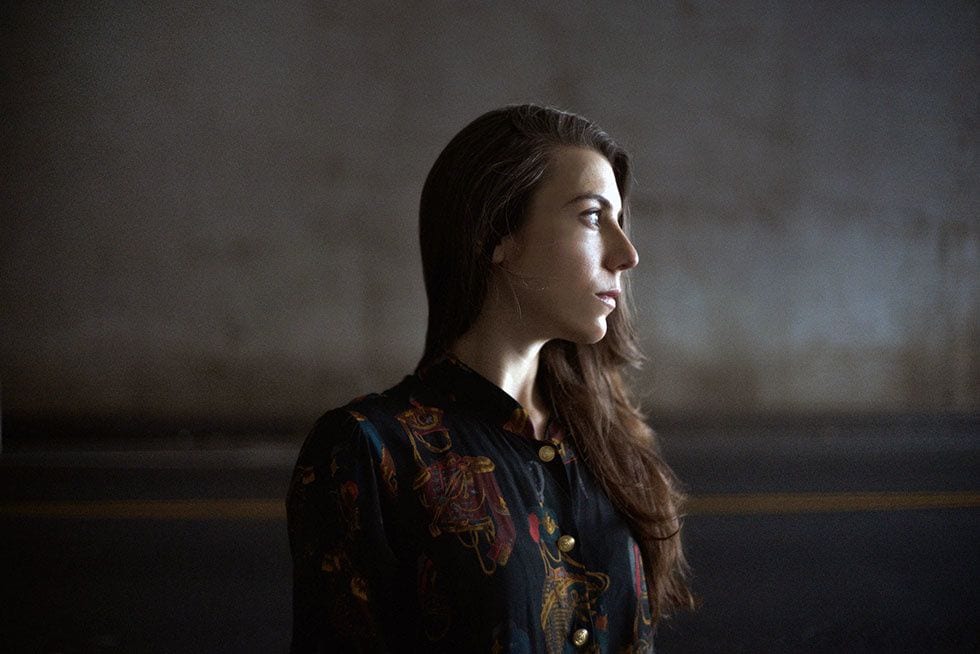
“How can I know what I think until I say it?” asks Julia Holter on “Les Jeux to You”, an astonishing art-pop rhapsody and one of the 15 tracks that make up her new double LP, Aviary. It’s a question that, like much of the album, is both playful and profound in the way that the best poetry often is. It’s also rhetorical: everywhere on Aviary, Holter finds meaning by reversing the old adage about thinking and speaking.
Last year, amid the mounting chaos defining our culture, Holter found herself at a loss for something to say. For many artists, our present moment seems to demand bold voices, and while it has never been easier to express ideas in public, communication has never felt more fraught. The constant cycle of crisis and response has us glued to phones and screens. “It’s too much pressure on humans,” she says. “I think it takes a toll and we’re all going insane.”
Bracketing the idea that her next record needed to make any kind of statement at all, Holter began improvising vocal melodies and synthesizer lines at her home in Los Angeles. Communication is something she has struggled with before and a reason why she seeks out music over, say, prose. “One thing I love about music is that it’s not there to communicate,” she says. “It’s not language.” She recorded hours of improvisations and listened back for happy accidents — “filtering out the good stuff” — a process that she says provided her with a cathartic way of addressing the kinds of problems she wanted to address. “I was ready to jump into the sound and let the sound bring out the meaning.”
With a team of collaborators, many of whom had spent the last few years touring in her backing band, Holter expanded these demos into Aviary, a 90-minute suite of orchestral and electronic excursions into crisis and the ways we make sense of it. Aviary is Holter’s fifth studio album (and third for UK-based label Domino) and the official follow up to 2015’s critically acclaimed Have You In My Wilderness, an airtight collection of lushly arranged chamber pop that made a number of year-end lists and introduced the singer-songwriter-composer to a broader audience. That album was the culmination of ten years of dabbling off and on in more traditional songwriting modes.
On Aviary, however, Holter returns to the strong avant-garde influence she is otherwise known for. The album crashes into being on the first track, “Turn the Light On”, which opens with a harp glissando that instantly unravels into an orchestral cacophony. Holter, who doesn’t often belt, belts over top the noise, the romantic subject matter of the lyrics creating yet another clash. Elsewhere, dissonance is a form of text painting, as with the squealing bagpipes of “Everyday is an Emergency”, while songs that appear to follow more familiar structures, like “Les Jeux to You” and first single “I Shall Love 2”, play with pop tropes like rhythm and repetition in unsettling ways.
Aviary is an album of stunning breadth, with a sound to match its ambitious runtime. Nevertheless, there’s something introspective about much of the material. Many of Holter’s home recordings remain in the final mix and give us a glimpse of an artist alone at home, tinkering with the tools at her disposal. In this respect, Holter belongs to a lineage of technologically innovative female recording artists, like Laurie Anderson, Kate Bush, and St. Vincent, but also to a much longer history of solitary creative practices. Indeed, she is fascinated by medieval scribes, and throughout Aviary, you can hear her trying out different ways of adorning language, making it into a thing of beauty that carries across space and time, like a manuscript illuminated with gold leaf.
Despite beginning at a loss for words, Holter has produced a textually rich record that pulls equally on pre-modern literary traditions and post-modern poetic procedures — and sometimes on both, as on “I Would Rather See”, in which she uses the mesostic experiment popularized by the poet and composer John Cage to rewrite poet Anne Carson’s translations of Sappho. For the closer, “Why Sad Song”, she wrote lyrics by phonetically translating a Tibetan chant, a technique that captures her philosophy about influence and inspiration. Although her references (for example: to Occitan Troubadours) can sometimes be arcane, she is adamant that her work is not academic but rather a process of translating and transforming source material. Academic is an adjective she rejects: “I’m not an academic person. Or not a traditionally academic person.”
Holter spoke with PopMatters about Aviary, writing procedures (a word she dislikes), and the trickiness of claiming a tradition.
Was there a conscious effort on Aviary to depart from the more accessible sound of your previous album, Have You in My Wilderness?
No. I think about each project differently: they’re their own creatures. Everything I work on, once it’s finished, becomes a creature independent of me.
For people who were first exposed to your work through Have You in My Wilderness, this new album might be a more challenging listen. Whereas, people familiar with Loud City Song (2013) or Ekstasis (2012) might see Wilderness as the outlier and Aviary as the extension of what you were doing on those earlier albums. How do you think people will respond to your return to a more avant-garde sound?
I don’t spend a lot of time thinking about what people want because I have no idea. Maybe if I were living in a more homogenous society where there was a strong tradition, then it might be different. But we live in a crazy, heterogeneous society. On the internet, everybody is so sophisticated, young people’s ears are so sophisticated, and I reject the idea that people need to put out short or accessible songs. Any kinds of guidelines about what music should be these days are confusing to me because things are just not that simple.
I don’t assume anything about listeners. I find that when you’re true to yourself, people respond to that because they need something with heart. As humans, we want something real and honest. Of course, it’s hard to know sometimes what’s real and what isn’t, even in your own work. But I can say that [Aviary], honestly, was very real. [laughs] I don’t know if people are going to like it or not, but I never know. I’m just always happy if people are listening.
Aviary has turned out to be a very literary album. Where does lyric writing fit in your overall songwriting process?
Words tend to come later. Words are harder for me. It takes a little more thinking. Whereas, I like the fluid way that sound comes for me. Language always has meaning. It’s a whole other element that you need to deal with. It’s fun but also challenging. Most of the time, I pull together the lyrics in a conventional way that probably most songwriters do.
Many lyrics have been reprinted in the liner notes to appear like poems. For example, fourth track “Voce Simul” has a striking appearance on the page, with the line lengths growing and shrinking again, resulting in a diamond-shaped text. Did the song lyrics began like that or did you format them that way later?
“Voce Simul” is one of the rare songs that began as text. I was looking at a medieval music theory treatise — not that I was reading it or anything — but I was looking at it. I took this phrase “voce simul” [meaning “voice together”], then I made up fake Latin, like Pig Latin. It was a fun, playful text, and I wrote it out in that way, though I don’t sing it in that way. For me, a lot of this record is about playing with language, initially just for the fun of the sound.
There are many places on Aviary where you play with the sound of language, as you say. On album closer, “Why Sad Song”, you’ve done a phonetic translation of a Tibetan Buddhist chant by Ani Choying Drolma.
That process is super suggestive. It’s not a translation in terms of meaning at all. It’s really a funny thing to do. It’s complicated, you know? There’s something to me that’s nice about different kinds of translations that aren’t based on meaning. To me, these processes help you follow the sound in a way that allows meaning to come out in a mystical way. I’m planning on learning more languages so I can do it in other languages and not just English.
Aviary came out of a struggle to find something meaningful to say. Have you found that poetic procedures help with that?
I think it’s liberating, but I would say, moreso, that it’s illuminating. Yes, it’s a procedure [interrupts herself] God, that’s such a terrible word, right?
It’s kind of clinical…
I said it earlier today, too. I wish there was a better word.
For me, the procedure is a way to get something out that’s a little more mystical. It’s more fun to me than writing from my own self. I think of art as theories of translation. Art is a recycling, a sharing across generations. Everything is translation, translation. Everything seems to me that way. It just makes sense to me to do these kinds of writing procedures. And it’s literally just so fun.
On “Les Jeux to You”, you sing, “How do I know what I think until I say it?” Has Aviary been a process of figuring out what you’re thinking by putting it into words?
I’ve definitely been super interested in this relationship between thought and composition. Ten years ago, I was interested in learning about medieval scribes, and one of the things that I learned is that people used to read out loud. Monks used to read out loud because they could not read quietly. It was hard to read because of the [condensed] way that words were pushed together in manuscripts. It’s interesting to me how reading used to be an aural activity. A sound activity. It wasn’t done silently. I don’t know where I’m going with this, but I’m just saying that I’ve always been interested in this kind of thing. “How do I know what I think until I say it?” There’s something there about the order of operations in creation.
On “I Would Rather See”, you engage with Sappho via poet and scholar Anne Carson. How does your work fit in or draw on a tradition like this of radical writing by women?
That’s a good question. That’s just one of those things that’s just there. I’m probably not aware of it. You get these questions that are like: how is your work political? How is your work personal? It’s all political. It’s all personal. Because you’re a person in the world. So likewise, I don’t know how my work fits in any tradition, but I know that I think of my work as translation.
So rather than carrying something forward, you think of your work as moving ideas in new contexts?
Yeah maybe, I don’t know. Maybe some people see themselves as working in a tradition of some type of movement, and I think that that sometimes is only apparent afterwards as well. Maybe I am doing that. That’s something for people to analyze later. So I’m happy if I’m in a tradition of radical women. It’s hard for artists to see what traditions they are in. I’m happy to be part of whatever tradition that people who are better at analyzing things decide to put me in.



